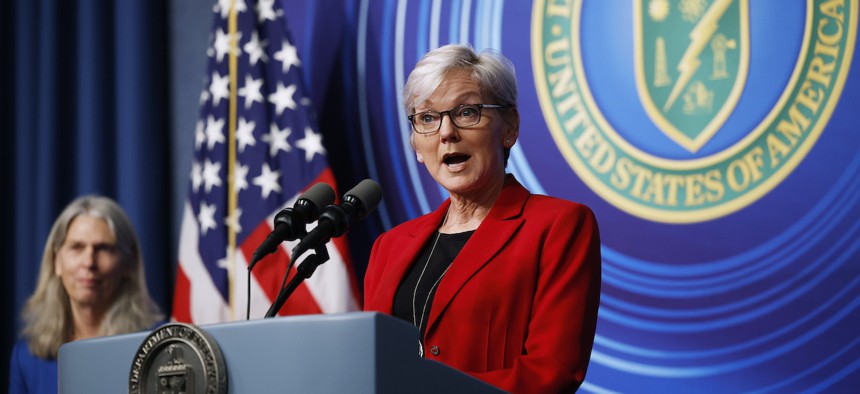
Energy Secretary Jennifer Granholm during a news conference at DOE headquarters on Dec. 13, 2022. Agencies will have to apply for the funds and the Energy Department will oversee them. Chip Somodevilla/Getty Images
Biden Administration Opens a $250M Fund for Agencies to Make Their Buildings More Efficient
Agencies will be able to tap into infrastructure law funds as they try to meet Biden's ambitious government sustainability plan.
Federal agencies can now tap into a $250 million fund for projects to make their buildings more energy and water efficient after the Biden administration on Thursday announced it would open up the money included as part of the recent infrastructure law.
The Energy Department will oversee the funding—to be provided as part of the Assisting Federal Facilities with Energy Conservation Technologies (AFFECT) program—which agencies will apply to access. Congress authorized the spending as part of the 2021 Infrastructure Investment and Jobs Act.
AFFECT is designed to help agencies adapt existing or build new facilities with “net-zero” projects, such as water conservation upgrades, electrification and sustainable design. Energy’s Federal Energy Management Program will authorize the grants and help agencies come up with ideas. The initiative will facilitate public-private partnerships, officials said, and lean on existing best practices in the energy conservation space. AFFECT predates the infrastructure law but was significantly smaller in scale before Thursday’s cash infusion.
“Collectively U.S. government agencies are the nation’s largest energy consumer, and they will play a major role in the U.S. meeting President Biden’s ambitious climate and clean energy goals,” Energy Secretary Jennifer Granholm said. “By leveraging the significant investments in President Biden’s Investing in America agenda, the federal government will lead by example, showing that everyone from homeowners to huge factories can conserve energy, switch to cleaner sources, and save taxpayers money.”
The program will support and supplement standard efficiency projects, such as include roof upgrades and new windows, with less cost-neutral ones like on-site renewable energy generation and storage and electric vehicle charging infrastructure, FEMP Director Mary Sotos said. AFFECT has gone through six funding cycles since 2014, but they all paled in comparison to the current offering. Sotos' team of evaluators will assess grant applications from agencies based on the expected energy savings, greenhouse gas emission reductions and cost reductions to make project selections.
The program is designed to support President Biden’s Federal Sustainability Plan to make federal agency operations entirely carbon-neutral by 2050. As part of an executive order to meet that goal, Biden mandated that all agencies maintain net-zero emission buildings by 2045. By 2032, agencies will have to cut emissions in all federal buildings, campuses and installations by 50% compared to a 2008 baseline on the path to making them completely net-zero. Already, all new, large construction and modernization projects have to include building designs that are net-zero emissions and reduce waste and water usage. Agencies have until 2030 to ensure at least 30% of their current facilities are retrofitted to eliminate emissions.
White House Council on Environmental Quality Chair Brenda Mallory said those efforts, sparked by Thursday’s $250 million cash injection, will transform the federal government’s 300,000 buildings.
"This investment will help achieve the president’s ambitious federal sustainability goals while creating good-paying jobs, lowering energy costs, and building healthier communities," Mallory said.
The White House has tasked agencies with slashing their greenhouse gas emissions by 65% by 2030 and developing carbon-free electricity plans. Late last year, agencies across government released their first annual progress reports toward Biden’s sustainability goals.
The White House also launched the Climate Smart Buildings Initiative, which aims to spark $8 billion in private sector investment to upgrade federal buildings by 2030, to be paid for as agencies realize energy savings. AFFECT funds help offset costs that do not provide direct savings, such as finding alternative energy sources for heating and cooling. The grants will ensure agencies can take a broad approach to making their buildings more sustainable, Sotos said.
Energy is planning to guide agencies through accessing the AFFECT funds, holding a meeting with their chief sustainability officers next week and an information webinar next month.
Sotos declined to weigh in on whether the administration’s goals are realistic, noting instead the current reality has forced the government’s hand.
“I think they are ambitious, and it will take a lot to make sure that we can achieve these goals in a way that also supports agencies’ missions,” Sotos said. “Realistic or not, this is what the climate demands.”







